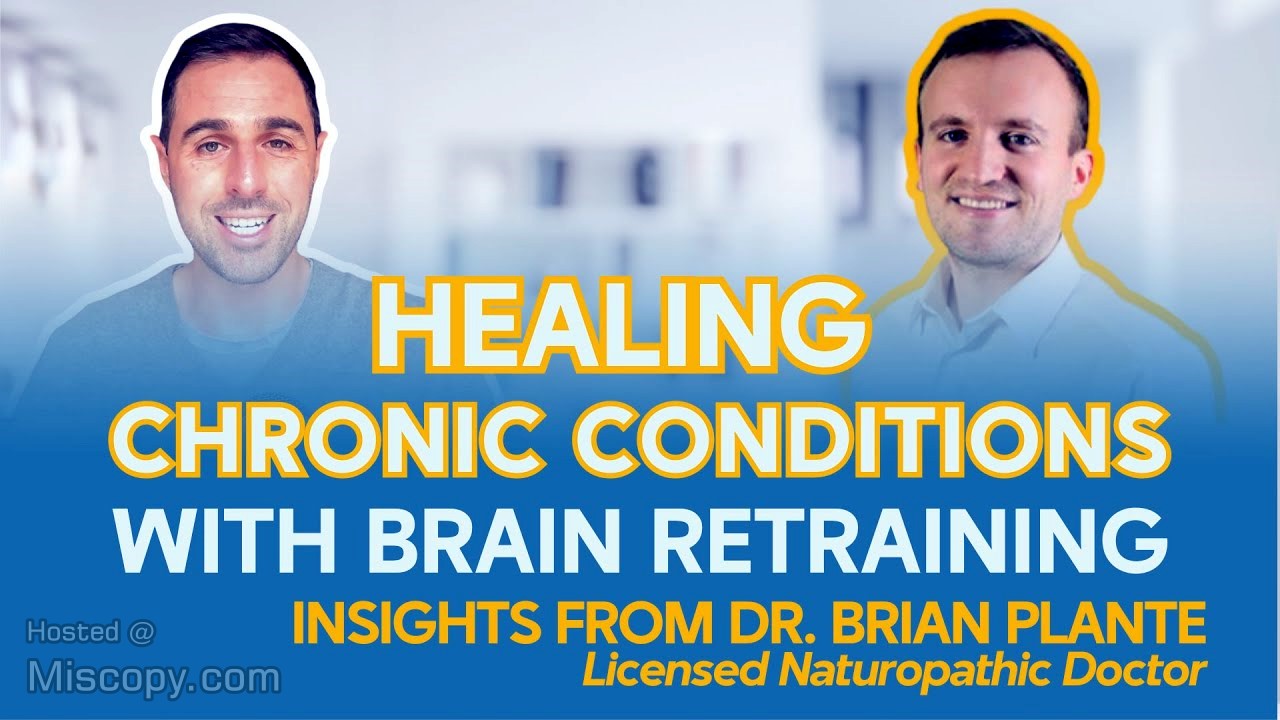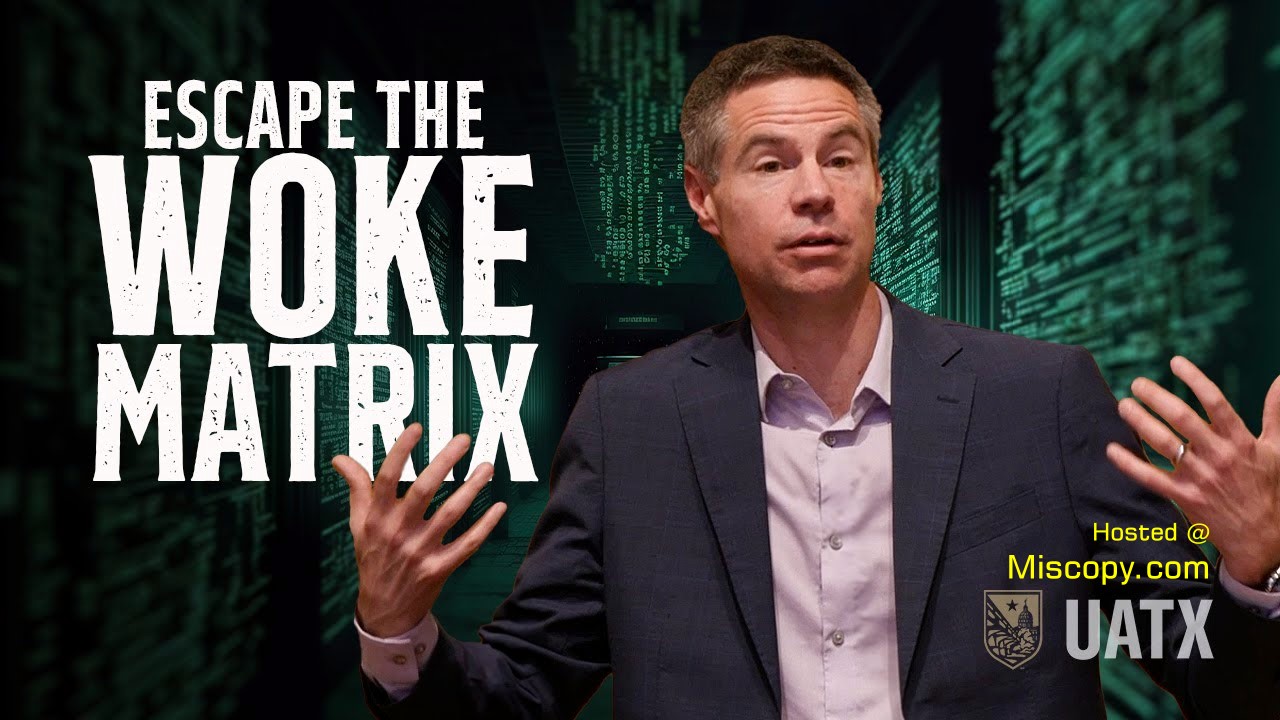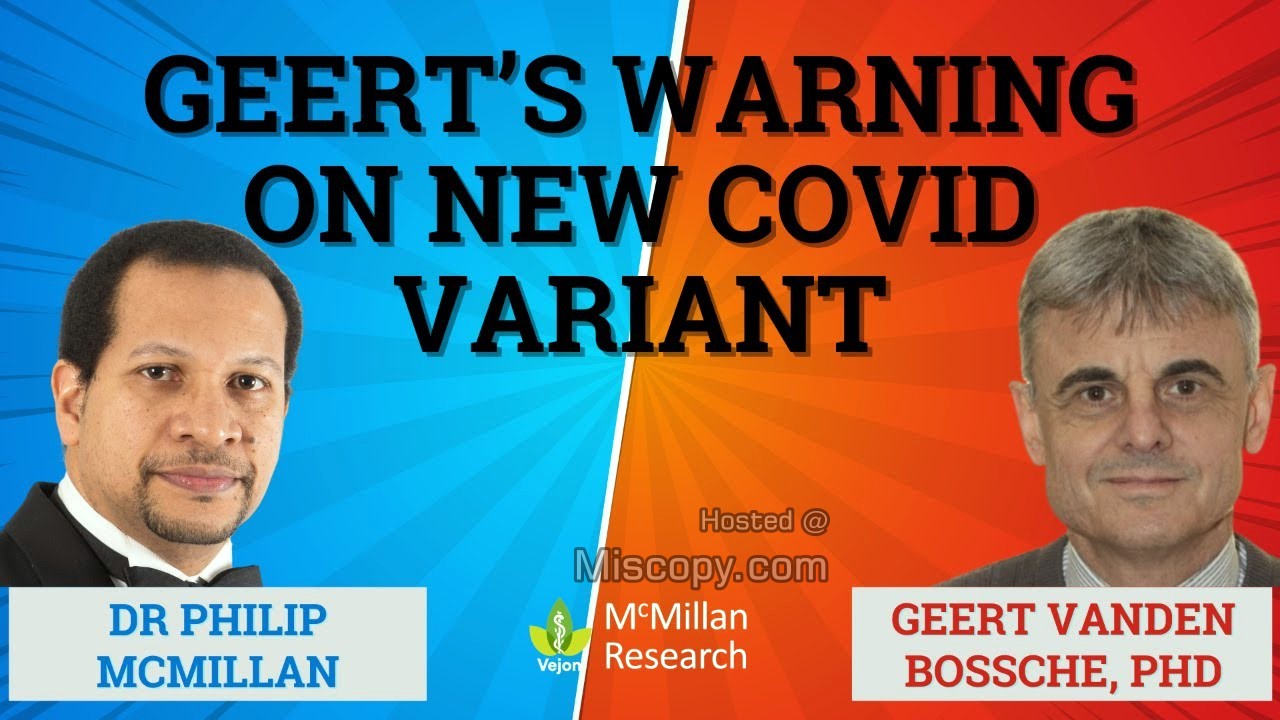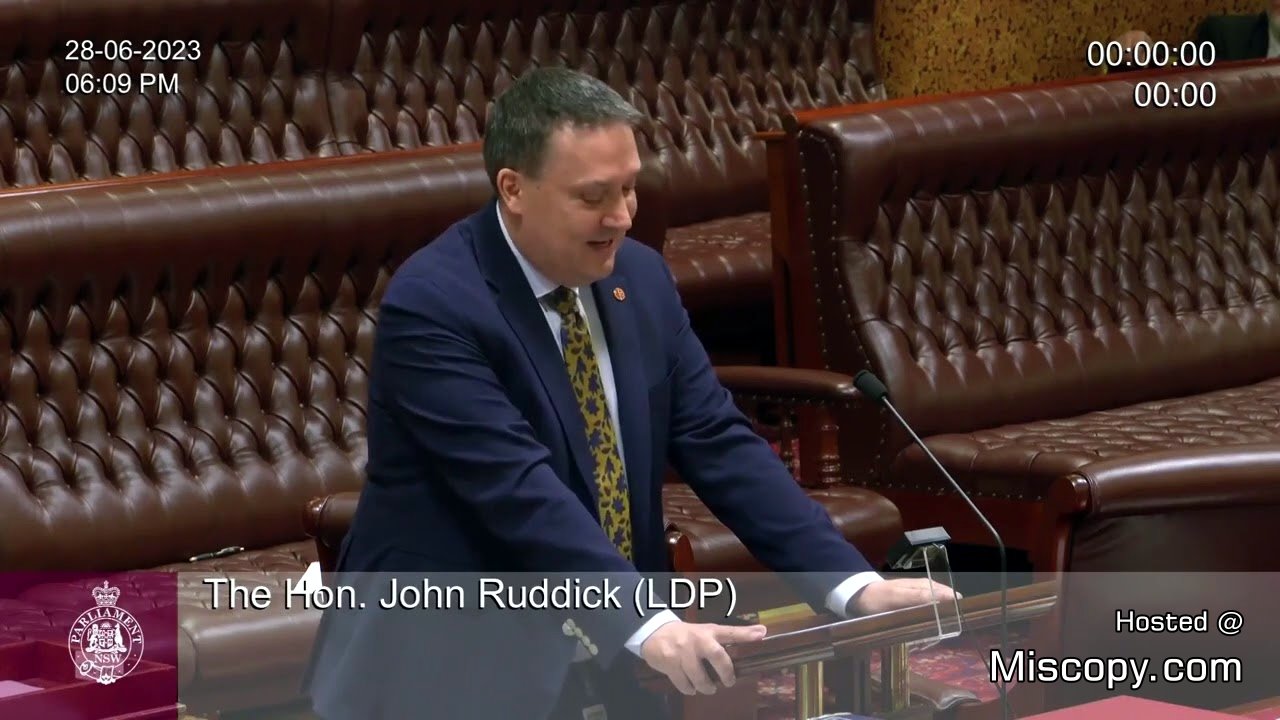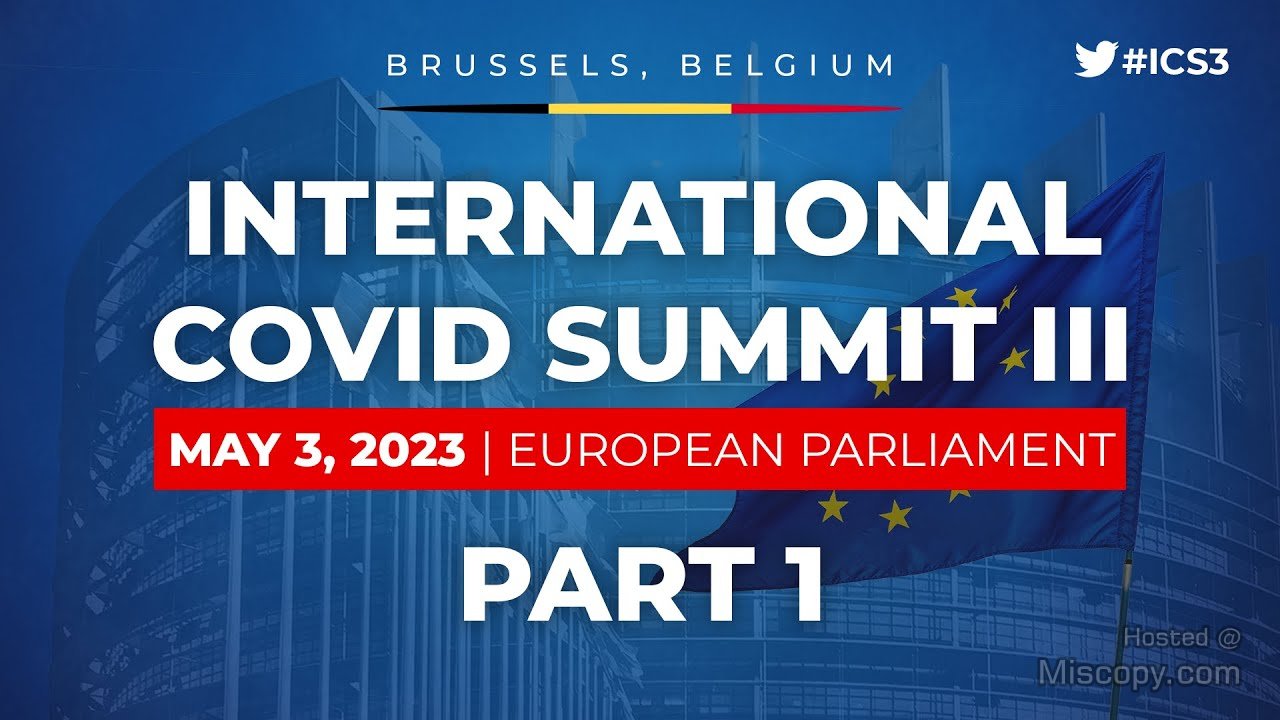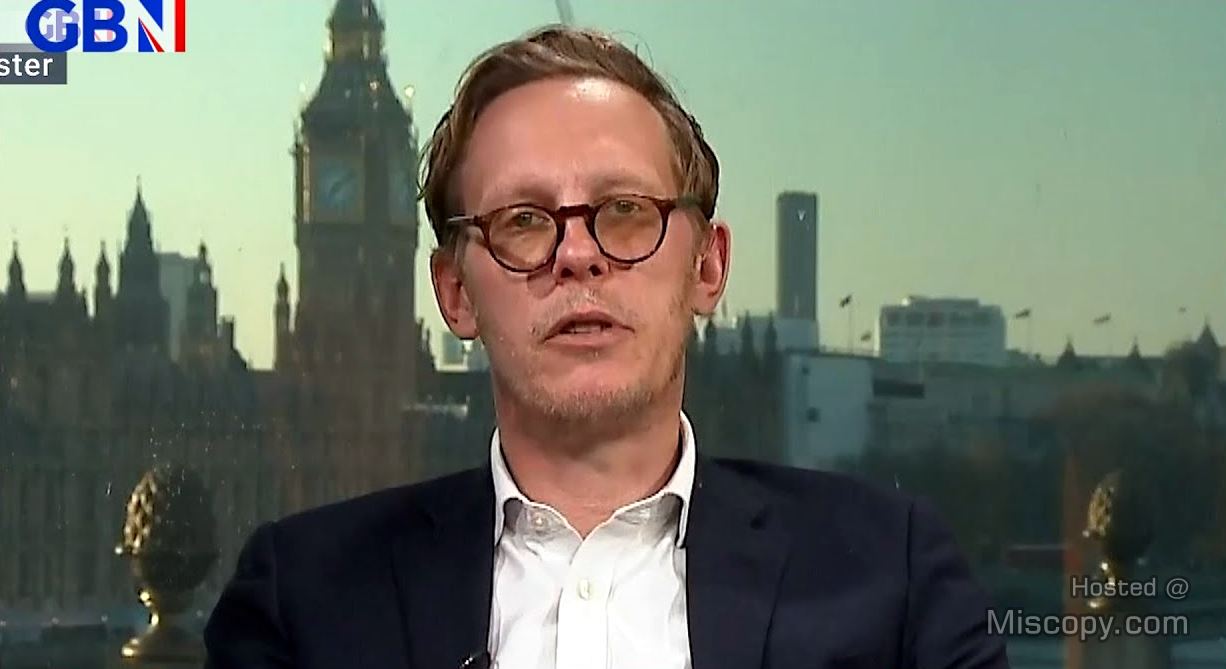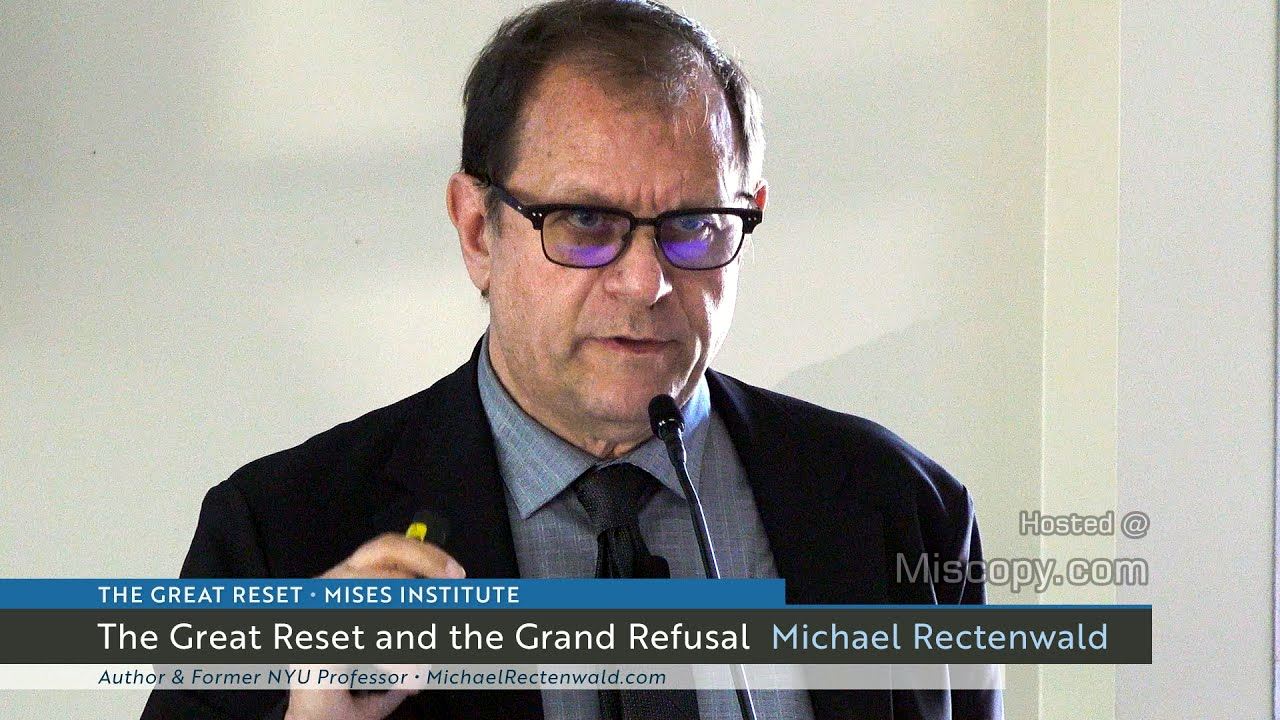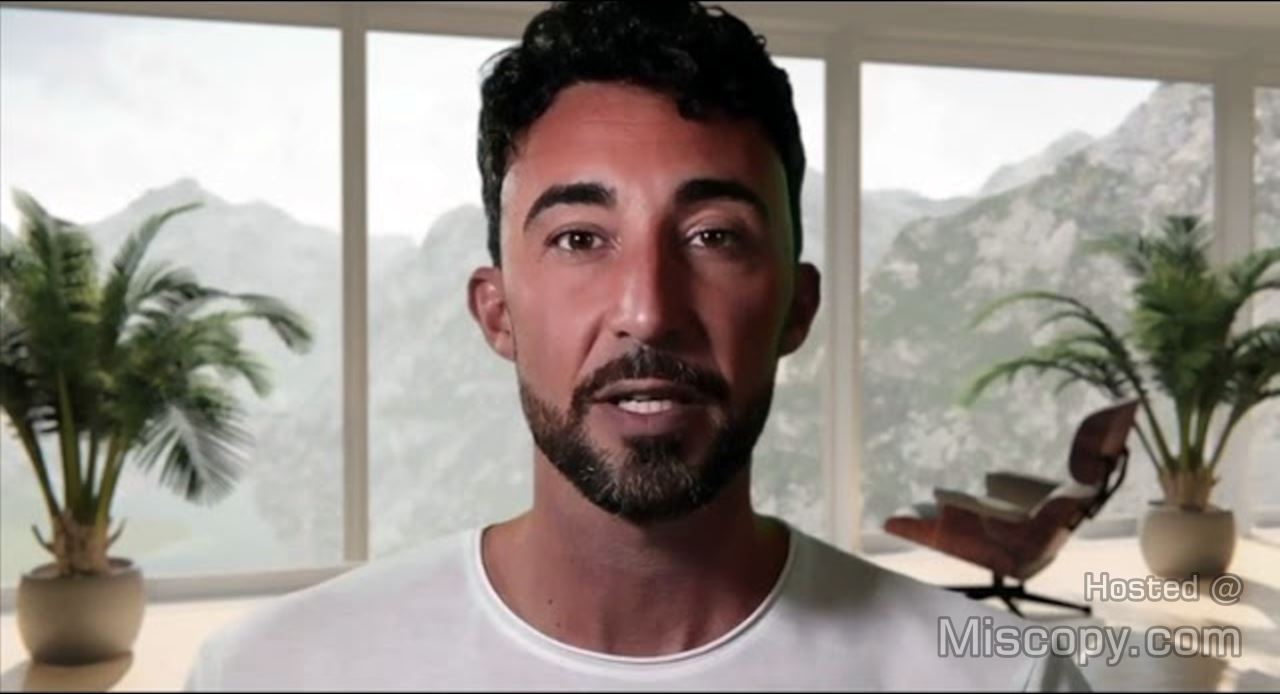The International Covid Summit III held at the European Parliament in Brussels saw speakers presenting their findings on various aspects of the COVID-19 pandemic. Topics included the history of coronavirus research, the violation of biological and chemical weapons treaties, and the potential premeditation of the pandemic.
Speakers also discussed the lies spread about the pandemic, including the myth of asymptomatic transmission and the effectiveness of lockdowns, while emphasizing the negative impacts of lockdowns on issues like poverty, starvation, and joblessness.
In addition, there were talks regarding the nasal spray vaccine, the autophagy lysosomal degradation pathway as a protective system against viruses, and how COVID-19 affects multiple organs beyond the lungs.
In the second hour of the conferance, the speakers discuss various aspects of the COVID-19 pandemic, including the cytokine storm and thromboembolisms, the use of omics technology, the morphology of the virus, its phylogenesis, the genetic composition of the virus, and the complexity of its immunology.
They also discuss the situation in Europe, including overcrowded hospitals and a scandal surrounding the release of images depicting the scale of the crisis. The effectiveness of non-pharmaceutical interventions, such as masks and lockdowns, is also debated, with some questioning their efficacy and others emphasizing the importance of historical context in decision-making.
The third hour of the conference covers a range of topics around the COVID-19 pandemic. One speaker explains the results of various studies on the efficacy of masks, highlighting that the Danish study showed no statistical significance in the difference of infection rates between mask-wearers and non-mask-wearers.
Another speaker discusses the use of hydroxychloroquine as a treatment for COVID-19 and notes that randomized studies are not ethical in an epidemic when a treatment is known to work. A key topic is the controversy around Ivermectin, which the speakers argue is an effective treatment for COVID-19 but is being suppressed due to conflicts of interest, politicization, and suppression of science by the pharmaceutical industry. The speakers also discuss the potential role of psychology in manipulating public behavior and decision-making during the pandemic.
In the remainder of the conference the presenters discuss problems with PCR testing, the changing definitions and goals of vaccinations, manipulation and hiding of vaccine data, the efficacy of vaccinations decreasing over time, and fatal flaws in CDC efficacy analyses.
Speakers highlight the importance of adhering to scientific definitions to avoid confusion and promote informed consent. They express their concern about how vaccines failing to stop infection and transmission can potentially drive the emergence of new variants and the need to acknowledge the value of naturally acquired immunity.
Additionally, they call for worldwide moratoriums on the use of mRNA vaccine technology for all species and comprehensive reviews of funding structures for public regulatory agencies to determine potential conflicts of interest.
00:00:00
In this section of the video, two members of the European Parliament, Christian Karish and Ivan Sinchich, welcome the attendees of the International Covid Summit III. They express their gratitude to those who have been fighting for their rights and liberties during these trying times. They also emphasize the importance of this event as a platform for sharing ideas and discussing the scientific, social, medical, and legal findings of the past three years of the covid crisis. Furthermore, they acknowledge the role of the MEPs in fighting for democracy and human rights in Europe while also celebrating the efforts made by U.S. Congress members and many others around the world. Lastly, they express their commitment to continue fighting for the people and their rights.
00:05:00
In this section, a speaker commends the attendees for following the science during the COVID-19 pandemic while also upholding human rights, rule of law, and freedom. They criticize certain bureaucrats and politicians who are not yet accepting accountability for their wrong decisions and discreditation attempts towards those who spoke the scientific truth during the pandemic. Attendees are here to exchange findings and send a strong message to European lawmakers, government agencies, and the public about early treatments, vaccine efficacy, and the legalities surrounding the pandemic.
00:10:00
In this section, two speakers, Stephen Malthouse and Patrick Ky, open the International Covid Summit III in the European Parliament in Brussels. Malthouse, a family doctor from Canada, thanks the hosts and speakers for attending the summit, which will focus on the pandemic after the declared first one. He urges the audience to keep an open mind and heart as the experts present their research-based material that might be different from what people have been learning so far. Ky, on the other hand, sees the summit as an opportunity to ask difficult questions about the human condition and rethink the history of biological patents leading up to the COVID-19 pandemic.
00:15:00
In this section, the speaker expresses his gratitude to the members of parliament for hosting the summit and acknowledges his wife’s role in encouraging him to share his insights on the pandemic with the world. He talks about his previous fame on mainstream media and how COVID-19 took that away from him, but he is happier to be standing with the people at the summit. The speaker then sets the historical context of the pandemic, dating back to the mid-1900s when the conversation of pathogen use began. He highlights how the coronavirus model was identified in 1965 as a pathogen that could be used for a variety of purposes but specifically in human manipulation. The first transatlantic coronavirus data sharing experiment was done in 1966, and the first human trials on inoculating people with modified coronavirus were done in 1967. The speaker questions where the human civilization was in allowing these experiments and violating biological and chemical weapons treaties.
00:20:00
In this section, the speaker discusses the history of coronavirus research, specifically noting that Pfizer filed a patent for a Spike protein vaccine in 1990. Despite this early research, publications on vaccines for coronavirus from 1990 to 2018 showed that vaccines were ineffective as the virus mutates too quickly for them to be effective. The speaker then delves into the 2002 patent filed by the University of North Carolina for an infectious replication-defective clone of coronavirus, which suggests a weapon aimed at specific individuals with no collateral damage. The patent preceded the SARS outbreak by a year and was funded by Anthony Fauci’s NIAID. The speaker suggests that this engineered SARS is not a naturally occurring phenomenon but rather a product of human research.
00:25:00
In this section, the speaker discusses the violation of biological and chemical weapons treaties and laws in the US. The CDC had filed a patent on SARS coronavirus in violation of these treaties and laws, after downloading the sequence from China, which led to the rejection of the patent application until the CDC bribed the patent office. RTPCR, the test allegedly identified to detect Coronavirus risks, was identified by the speaker as a bioterrorism threat in Europe in 2002 and 2003. Furthermore, the pathogen was described as a bioweapons platform technology in 2005 and a bio-warfare-enabling agent from that point forward. The gain-of-function moratorium to freeze any efforts to do gain-of-function research was conveniently suspended, as the University of North Carolina received an exemption from the grant. This led to the publication of the journal article stating that SARS Coronavirus is poised for human emergence.
00:30:00
In this section, a speaker at the International Covid Summit III discusses the potential premeditation of the Covid-19 pandemic. They quote a statement made in September 2019 that the world would experience an accidental or intentional release of a respiratory pathogen to allow for a universal vaccine template to be created. The speaker argues that this alleged release was premeditated domestic terrorism and an act of biological and chemical warfare perpetrated on the human race. They criticize the lack of independent review boards since 1965 and call for an end to gain of function research, weaponization of nature, and corporate patronage of science for self-interest.
00:35:00
In this section of the video, the speaker from Status Analytics argues that the initial narrative surrounding COVID-19 was based on fear rather than reality. They claim that the reality was that the virus posed a high risk to few people and negligible risks to most, that asymptomatic people were not major drivers of disease spread, and that lockdowns and mask mandates did not work and caused harm. The speaker also criticizes the World Health Organization for conflating case fatality rates with infection fatality rates, causing a misunderstanding of the true fatality rate of COVID-19. They argue that the infection fatality rate is less than 0.1 percent and that the virus presented a minimus risk to healthy people under the age of 70 who were not in the hospital for a severe comorbidity.
00:40:00
In this section of the International Covid Summit III, the speaker discusses several lies that have been spread about the COVID-19 pandemic. One of these lies is that the virus was novel and therefore more dangerous, when in fact it had been identified early on as a variant of SARS. Another lie is the myth of asymptomatic transmission, which was based on flawed studies and contradicted by experts. The speaker also discusses the idea that lockdowns saved lives, which is debunked by multiple studies showing no benefit to the implementation of lockdowns or other non-pharmaceutical interventions. The speaker argues that lockdowns may have actually been pro-contagion and that maximizing the differential mobility of the elderly and young is key to minimizing mortality.
00:45:00
In this section, the speaker presents evidence to suggest that lockdowns were not effective at reducing COVID-19 mortality rates and instead resulted in a shift of the disease burden to vulnerable elderly populations. A scatterplot is shown indicating no relationship between lockdown stringency and COVID-19 mortality. Additionally, a comparison of pandemic curves for countries with and without lockdowns, and with and without mask mandates, reveal virtually identical results. The negative impacts of lockdowns are discussed, including increased child deaths, poverty, starvation, and joblessness. The presentation suggests that public health officials and industry leaders were waiting for a pandemic to occur in order to launch a vaccine, ultimately resulting in what the speaker considers to be a complete lie surrounding the sudden need for global vaccination.
00:50:00
In this section, the video discusses how a nasal spray vaccine would have been more effective at preventing transmission and infection of COVID-19, and how the lack of development of this type of vaccine was a mistake that was belatedly recognized by experts. The speaker also highlights how there has been a continuous stream of lies and collusion between politicians, media, and health experts around the world regarding the true nature of COVID-19. Additionally, a pathologist presents their perspective on the disease, stating that COVID-19 is not as unknown as it was initially presented, and that better management of the disease could have been achieved through following basic medical teaching. The pathologist also provides information on the symptoms and severity of the disease.
00:55:00
In this section, the speaker discusses the history of respiratory diseases and the similarities between SARS and COVID-19. The speaker highlights the importance of the autophagy lysosomal degradation pathway as a protective system against viruses, and how COVID-19 exploits and modulates this pathway to escape degradation. The speaker notes that in older individuals, this pathway is less efficient, leading to a hyper-induction of the inflammatory and immune response, resulting in a cytokine storm. The speaker points out that there are many inhibitors and monoclonal antibodies that can stop the cytokine storm. Lastly, the speaker mentions that COVID-19 not only affects the lungs but also other organs, including the intestine and vasculature.
01:00:00
In this section, the speaker discusses the cytokine storm and its role in causing disseminating intravascular coagulation with thromboembolisms. The presence of thromboembolisms makes it difficult for the patient’s oxygen to be exchanged and causes their condition to deteriorate rapidly. The speaker also points out the subtle mistake of not conducting autopsies to determine the cause of death. Moreover, patients who were given just paracetamol were not counteracting the inflammation caused by the virus. Inflammation anti-inflammatory drugs could have been more effective in treating the patients. Finally, the speaker also points out that the other effects of the spike protein, whether from the virus or the vaccine, are causing altered control of blood pressure.
01:05:00
In this section of the transcript, the speaker discusses how using omics technology could have improved the handling of the COVID-19 pandemic. This technology could have been used to create personalized profiles of patients in order to understand who was most susceptible to the disease and would benefit from vaccination. The speaker emphasizes the importance of trusting in science rather than relying solely on technology for solutions. They also mention the need for early treatment and studying the cellular and molecular pathways of infection. The speaker ends with a quote from Giordano Bruno about the potential consequences of relying on technology without understanding ourselves.
01:10:00
In this section, the discussion revolves around the morphology and characteristics of SARS-CoV-2, including its genetic description and taxonomy. The virus is well-known, with its unique characteristics leading to its classification as a sabercovirus. The discussion also touches on the ac2 receptor, which the virus binds to, and the coefficient of reproduction or the measure of how effective a disease is, which has been calculated to be between two and four. The speaker explains that the horizontal coefficient differs from a spherical one in terms of how infectivity is communicated.
01:15:00
In this section, the speaker discusses the phylogenesis of the coronavirus and explains that it is a very old family that has evolved progressively into producing less pathogenic diseases over time. The DNA of animals acts as a reservoir for ancient coronaviruses due to their long-lasting cohabitation. The speaker points out that interference is one of the natural virtues of the complex human immunity that helps little to no susceptibility to certain infections. Furthermore, there is still no evidence of where the virus came from, and the speaker offers a provocation highlighting that if pangolins and bats wanted to mix and share the coronavirus, they had enough time to do so, but they did not.
01:20:00
In this section, Professor Claudia Colucci discusses the genetic composition of the COVID-19 virus and how it is not different from any other virus, as it is the result of genetic cells and the reaction of the host. She explains that there are many ways the virus can enter a cell and replicate, and at the end of replication, it puts a black spot in the cell, which causes the cell to commit suicide. Professor Colucci stresses that immunity is not just limited to antibodies, as efficacy of a treatment is not just measured by antibodies; rather, it involves other factors as well. Furthermore, she suggests that the mechanism by which the fusion and entry into the interior of every cell takes place is not a delivery, it is then subjected to coupling to complex processes, but this is subject to errors and enlarged by the decoyrants.
01:25:00
In this section of the video, the speaker talks about the complexity of the immunology of COVID-19 and how different it is from traditional vaccines. He emphasizes the need for precise scientific terminology in discussing COVID-19 treatment, suggesting that the mRNA treatment should not be referred to as a vaccine. The speaker presents a case of a 15-year old girl who had the virus only in her bowel, highlighting the importance of correct diagnosis. He concludes by discussing the use of epidemiology as a tool to analyze and understand the causes and effects of COVID-19, saying that independent and dependent variables must be set and measured to determine the factors that contribute to the spread of the virus.
01:35:00
In this section, there is an excerpt from the International Covid Summit III where the speakers discuss the situation in Europe amidst the pandemic. They mention the Paris crisis and the strain it has put on respiratory care units, as well as the issue of overcrowded hospitals. The speakers also discuss journalist El Mondo’s investigation into a crematorium in Madrid, where the secretary for foreign affairs allegedly tried to prevent the release of images depicting the scale of the crisis.
01:50:00
In this section of the video, Dr. Louis Vachon, an intensivist in Marseille and a member of the independent scientific council, discusses the benefits and risks of non-pharmaceutical interventions, such as masks and lockdowns. He stresses the importance of having a clear historical context and avoiding being disoriented in space and time when making decisions about these interventions. Dr. Vachon then gives a timeline of the mask and lockdown mandates in France from 2020 to 2021.
01:55:00
In this section, the speaker presents various sources of information that question the effectiveness of wearing masks for the general population. The World Health Organization previously believed that masks were of no use in the general population, and 120 different trials support this. Additionally, manufacturers and the boxes of masks themselves claim that they do not provide any protection against the coronavirus. The use of masks has also been compared to torture experienced by prisoners in Guantanamo, and it has become a new normal for children in Thailand. Further studies have shown that medical and surgical masks have no effect in preventing respiratory illness.
02:00:00
In this section, the speaker discusses various studies conducted on the effectiveness of masks in preventing the spread of COVID-19. The Danish study showed no statistical significance in the difference of infection rate between mask-wearers and non-mask-wearers, whereas a Bangladeshi study cited by the government and media showed a relative efficiency of 11% in reducing COVID-19 symptoms, but an absolute efficacy of only 104 persons. A study in Catalonia, Spain involving 6.6 million children showed no significant difference in infection rates between mask-wearers and non-mask-wearers. The speaker also mentions the risks of wearing masks, such as increased CO2 in the blood and contaminated masks.
02:05:00
In this section, a speaker discusses the failure of lockdowns in slowing the spread of the COVID-19 pandemic and the risk of social and economic inequality that it poses. They also mention a consensus conference, which found that masks in general populations, including children, should be avoided, as there is still no evidence of benefits after three years of mask mandates. The speaker uses mathematical modeling to compare the diffusion rate of the infection between countries and concludes that lockdowns have increased the speed of virus diversion by 50%. They argue that lockdowns must be avoided, and there is significant risk for children wearing masks.
02:10:00
In this section, a French researcher speaks about the laboratory in Marseille that has over 4 million euros worth of equipment and is a reference center for epidemic preparedness in Southern France. During the COVID-19 pandemic, the laboratory conducted tests on over 3,000 people, cared for over 30,000 outpatients and over 5,000 patients in the hospital, and developed COVID-19 tests. They also conducted 100,000 PCR and generic studies for different variants. The researcher also discusses their early use of chloroquine, which they were familiar with due to previous experience in treating tropical diseases.
02:15:00
In this section, the speaker discusses how they conducted studies on the effectiveness of hydroxychloroquine as a treatment for COVID-19. They started with a small study on 24 patients and found that it had a slight effect on viral loads. They then did an observational study on 1,000 patients and found that hydroxychloroquine was more effective than no treatment. They argue that randomized studies are not ethical in an epidemic when a treatment is known to work. They conducted a study on over 30,000 patients and found that hydroxychloroquine works better than no treatment. They point out that the pressure on this treatment is due to its effectiveness in reducing mortality in elderly patients and that vaccines for acute respiratory infections are not efficient in controlling virus spread.
02:20:00
In this section, the speaker discusses several concerning issues related to the COVID-19 pandemic. They present data showing that vaccinated individuals are still contributing to the spread of the virus and highlight conflicts of interest, politicization, corruption, and suppression of science. The speaker also shares examples of cyber harassment and censorship of scientific information on platforms like YouTube. They then shift the focus to the topic of Ivermectin, a drug that has been shown to be effective in treating COVID-19 but has faced disinformation campaigns aimed at suppressing evidence of its efficacy. The speaker argues that the war on Ivermectin is a global campaign whose only objective is to keep people away from this life-saving drug.
02:25:00
In this section, the speaker discusses the long-standing war on any generic, off-patent drugs that threaten pharmaceutical profits, highlighting how any medicine that costs a dollar or two dollars will not find regulatory approval in any advanced health economy around the world. She points out that this has resulted in people dying frequently and in high numbers due to being unable to access recommended medicines. The speaker identifies Ivermectin as a drug that presents a massive threat and probably would have halted the vaccine campaign if people were following the rules. She explains how the pharmaceutical industry uses disinformation and tactics such as propaganda and censorship, which are historically unparalleled due to their global media and communication systems’ consolidation. Merck is singled out as an example for raking on Ivermectin and denying the Nobel prize-winning discoverer’s request to study it in COVID-19.
02:30:00
In this section, Dr. Pierre Kory discusses the 95 controlled trials and 134,000 patients that have been treated with Ivermectin. Despite its efficacy, the medication is not recommended by any advanced health economy, and almost all hospitals have removed it from their formularies. Dr. Kory highlights that there are only six heavily-funded, high-quality trials that have been published in top journals such as the New England Journal of Medicine, the Journal of American Medical Association, British Medical Journal, The Lancet, and the Annals of Internal Medicine, which seem to show that Ivermectin is not effective contrary to all the other trials. However, Dr. Kory argues that those six trials were the only ones where almost every single investigator of that trial was drowning in pharmaceutical company financial conflicts of interests, and this may have interfered with the results.
02:35:00
In this section, Dr. Peter McCullough speaks about the Ivermectin trial conducted by the University of Oxford and how they have not published the positive results, despite the trial being completed 10 months ago. He shared that they allowed up to 14 days before starting the medicine, which made it a fake trial. He also talked about the editorial mafia that controls the top medical journals, where positive randomized controlled trials of Ivermectin were rejected from publication, while those that managed to get published were suddenly retracted. Dr. McCullough questioned the selective publication of negative trials by pharmaceutical companies and conflicted researchers.
02:40:00
In this section, the speaker discusses the potential power of the media in making decisions during the COVID-19 response. He poses several crucial questions regarding the impact of group pressure on individuals and whether the public was exposed to psychology during this time. The speaker argues that a PR campaign against Ivermectin was launched, and professional societies sent out memos calling for an immediate cessation of prescribing Ivermectin after an increase in prescriptions. He declares that it is one of the most effective drugs in history and claims that the campaign was launched since they saw they were losing the war against Ivermectin. The speaker considers this a crime against humanity, and no one will go to jail for it.
02:45:00
In this section, the speaker describes the psychology of conformity and how it has been used to manipulate the public during the COVID-19 pandemic. Research showed that people tend to conform to the crowd, even if they know it’s wrong. Those most likely to conform were low status individuals with a high need for approval. Fear is a major factor in increasing conformist behavior, as it shuts down critical thinking. The speaker also mentions how organizations such as the UK Sage and the Behavioral Insights Team used psychological manipulation to achieve their desired outcomes during the pandemic. Isolation and fear were upregulated to increase conformist behaviors in people.
02:50:00
In this section, the speaker discusses how contradictory messages from the media created confusion, which is a key element of mind control. He questions if the public exposure of vaccine status through work mandates was used as a deliberate attempt to trigger group pressure and increase compliance. He talks about the concept of trauma bonding with authority and whether the heavy-handedness of the authorities was meant to facilitate Stockholm syndrome. Finally, he suggests that criminal charges need to be laid for the alleged weaponization of psychology against the public.
02:55:00
In this section, the speaker, a chief operating officer of a company that develops immunosuticals and an associate professor of viral immunology at the University of Guelph, shares his concerns about the science underpinning Covid-19 vaccines. He points out that the primary rationale for vaccine mandates and masking mandates, which is asymptomatic transmission, is not a substantial driver of transmission of the SARS coronavirus 2 pandemic, and he backs it up with literature that establishes that studies arguing in favor of asymptomatic transmission are fatally flawed. He emphasizes that he bases all of his messaging on peer-reviewed published science and believes that everyone deserves respect and love.
03:00:00
In this section of the video, the speaker discusses PCR testing and the importance of calibrating the test to differentiate between infectious and non-infectious virus particles. He highlights a study conducted by the Public Health Agency of Canada, which concluded that there was no evidence of infectious virions if the cycle threshold was less than 24. However, many papers have suggested that asymptomatic people could be a problem in spreading COVID-19, but the speaker argues that if sick people stay home, the virus will not spread. The speaker also warns that using unclear language, like turning vaccination terms into buzzwords, and not adhering to scientific definitions causes confusion and hinders the public’s ability to give informed consent.
03:05:00
In this section, an immunologist explains that the definition of a vaccine has been changed in the United States to accommodate the new COVID-19 shots, and under the new definition, even yogurt would be considered a vaccine. The traditional textbook definition of a vaccine is that once vaccinated, one cannot get the disease or transmit it to others, which is what the public was thinking about when the term vaccine was applied to COVID-19 shots. The shots were originally intended to prevent infection, not dampen the severity of the disease, but the goalposts were moved. Through a freedom of information request, a document was obtained that shows that the Pfizer vaccine was intended to prevent infection, not dampen the disease. The vaccines cannot prevent infection or transmission, but Pfizer failed to meet its contractual duty, according to the speaker.
03:10:00
In this section, a speaker discusses the manipulation and hiding of vaccine data, giving examples such as the unusual clustering of cases and hospitalizations after the first dose of the Pfizer vaccine and the refusal to overlay data based on vaccination status. The speaker also cites Pfizer’s own six-month clinical trial data update which shows no statistically significant benefit of the COVID-19 vaccine in reducing death, with numerically more deaths in the vaccinated group than the unvaccinated. The speaker goes on to emphasize the superiority of natural immunity and the lunacy of vaccine passports without checking the immune response of individuals. Lastly, the speaker highlights the superiority of natural immunity to vaccine-induced immunity in terms of cases, severity of disease, hospitalizations, and deaths.
03:15:00
In this section, a speaker highlights concerns that the vaccines may be making people more susceptible to Covid-19, particularly those who have been boosted with bivalent vaccines. The widespread use of vaccines that fail to stop infection and transmission can drive the emergence of new variants, similar to chemotherapy resistance and antibiotic resistance. Therefore, vaccines need to acknowledge the value of naturally acquired immunity. Additionally, there needs to be a worldwide moratorium on the use of mRNA vaccine technology for all species and comprehensive reviews of the funding structures for public regulatory agencies to determine potential conflicts of interest. Finally, there should be objective third-party scientific reviews of the raw data from submission packages that go to regulatory agencies and novel public health data to ensure integrity.
03:20:00
In this section of the transcript, the speaker discusses how the efficacy of vaccines decreases over time, which means that vaccinated people are more likely to get infected with Covid than unvaccinated people who have never been vaccinated. The speaker presents data that led the CDC to state that the vaccines do not work for the purposes of public health infection control. The vaccines only provide minimal protection against infection and transmission after receiving the most recent dose, although protection can wane over time. The speaker argues that the state’s only interest in mandating vaccines is to prevent transmission, and given that the vaccines do not prevent transmission, the state should not mandate them for the prevention of infection. The speaker also briefly touches on epidemiology and the different types of studies that can be done to evaluate vaccine efficacy.
03:25:00
In this section, the speaker discusses a fatal flaw in every vaccine efficacy analysis that the CDC has published in its in-house journal, morbidity mortality weekly report – the use of odds ratio as a parameter instead of relative risk. The speaker argues that the use of odds ratio skews the data and provides incorrect vaccine efficacy rates, which the CDC has repeatedly failed to correct, leading him to distrust the agency. The speaker questions how the CDC can have dozens of professionals involved in the publications and still make such a mistake.
YouTube Video
https://www.youtube.com/watch?v=bFLPWWCAHfQ
